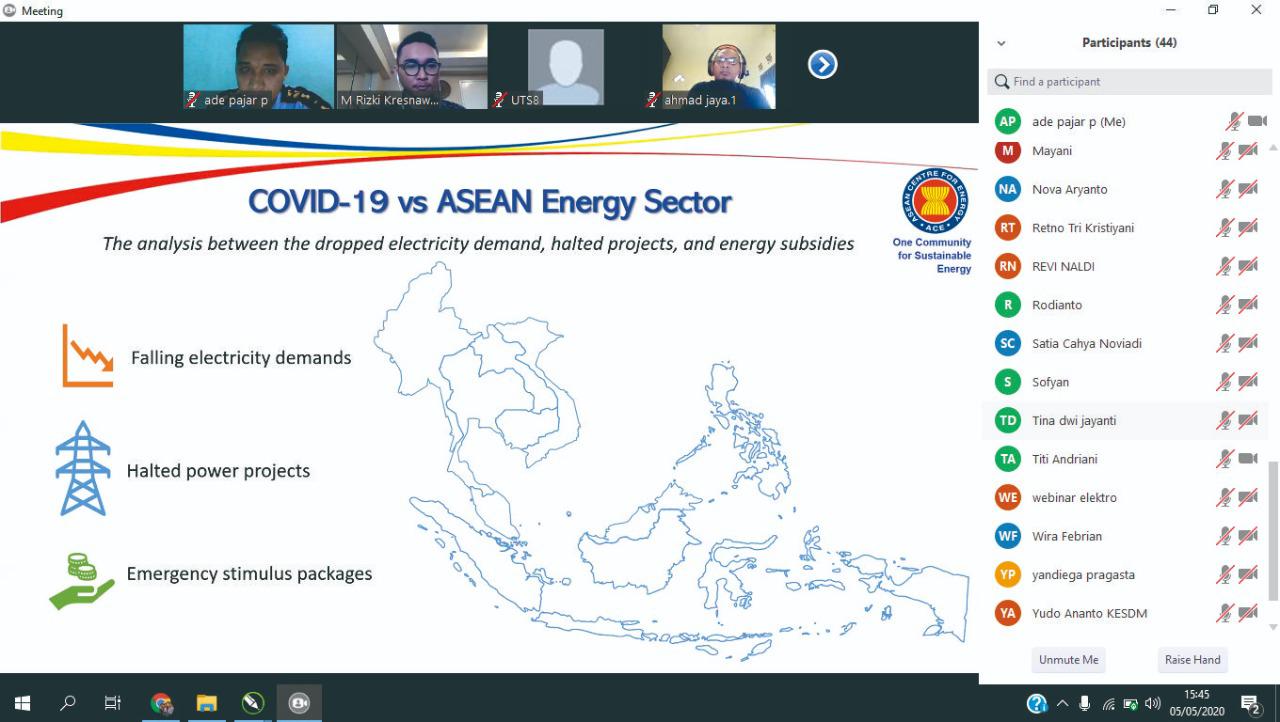Jakarta, 5 May 2020
As COVID-19 already spread all around the world, global economic activities have been slowed down. Various people’s mobility restrictions were causing declining energy consumption in many sectors; electricity is one of them. On 5 May 2020, research analyst of ASEAN Climate Change and Energy Project (ACCEPT), Mr Muhammad Rizki Kresnawan, has been invited to deliver a guest talk in the webinar session held by Universitas Teknologi Sumbawa (UTS). Apart from Mr Rizki, the webinar also invited the Manager of local State-owned Energy (SOE) utilities called PLN of Sumbawa, Mr Irwanto Wahyu Kusumo.
The webinar was opened for the public and attended by various participants from academics, businesses, as well as governments. During the webinar, Mr Rizki was carrying the presentation of the impact of COVID-19 pandemic in the ASEAN electricity sector. The presentation was developed based on the Energy Insights that been written and analysed timely by himself in cooperation with a researcher from ASEAN Energy Database System, Ms Nadhilah Shani.

In his presentation, Mr Rizki emphasised three main issues that have been apparent in the ASEAN electricity sector during the COVID-19 pandemic. The first is how the power utilities cope with the plummeted electricity demand in several ASEAN Member States (AMS). With the period of people’s mobility restriction is vary amongst countries, it somehow will lead to the utility’s technical adjustment and earnings. However, such shifts in energy demand would likely have a domino impact on lower usage in the sector, including such coal or natural gas, as many countries are already relying on it. Besides the lowered electricity demand, it also reported that some AMS had been announced their postponed power projects caused by the global supply chain disruption due to the COVID-19 pandemic restrictions on people’s mobility. This second issue will leave the country to contemplate; what will happen after the situation is back to normal since the halted and delayed power projects will probably shift the focus of some national power master plan.
Apart from the two mentioned issues above, Mr Rizki also highlighted some emergency stimulus package for the people who classified under low-income economies since they are the ones who severely impacted by the coronavirus crisis. When some of them rely on daily wages, the policy of restriction left them unable to have significantly reduced incomes and stranded small businesses. In terms of supporting this group, several ASEAN governments are offering a variety of forms of support programs, several of which intended to relieve their electricity bills. However, this can contribute to the problem of whether this transitional program would fit through the broader national subsidy scheme after the pandemic stops. Will the energy subsidies program be evaluated and moved to the most recoverable sector, such as healthcare and the economy?
Closing the session, Mr Rizki concluded that the declining demand for energy is a severe influence of COVID-19 as a quarantine procedure that urges power utilities to cope. Led with immediate technical adjustment and the need to update the power development plan as soon as things return to normal, the pandemic brings instability to the whole power system. Later down the track on the policy side, there is a need for emergency measures to reconcile these two: to allow the people impacted to access energy and to help power providers to withstand lessening revenues.
For more details, please see the presentation file here, and For further analysis, please access this link.
(MRK)